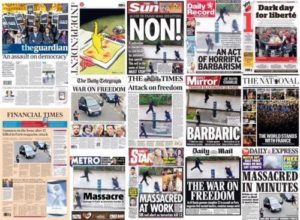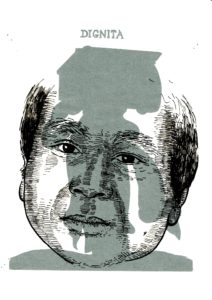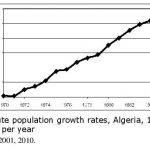Paula Bermann ~ Deze ontspoorde wereld – 29 augustus 1941
 Voor ons is het een ongelukkige tijd. De laatste weken blijven de verontrustende berichten komen, iedere dag brengt een nieuwe catastrofe. Eerst het geld, nu moet ook het huizenbezit worden opgegeven, en gisteravond kregen we van het stadhuis de mededeling dat Sonja vanaf 1 september niet meer naar het lyceum mag. Er worden scholen met Joodse leraren gevormd, alle Joodse kinderen moeten daarheen. Ik huilde en mijn dienstmeisje, dat zo op Sonja is gesteld, barstte in snikken uit, zo’n verdriet had ze ervan. Het arme kind, ze hing zo aan de school, had zoveel vriendinnen, leerde zo graag en goed en nu moet ze haar beste vriendin Elsje missen. Wat een geluk dat Inge het eindexamen achter de rug heeft, en wat zal er met Hans gebeuren? Zal hij verder mogen studeren? Ik koester weinig hoop en denk van niet. Een volle Jood moet worden vernietigd.
Voor ons is het een ongelukkige tijd. De laatste weken blijven de verontrustende berichten komen, iedere dag brengt een nieuwe catastrofe. Eerst het geld, nu moet ook het huizenbezit worden opgegeven, en gisteravond kregen we van het stadhuis de mededeling dat Sonja vanaf 1 september niet meer naar het lyceum mag. Er worden scholen met Joodse leraren gevormd, alle Joodse kinderen moeten daarheen. Ik huilde en mijn dienstmeisje, dat zo op Sonja is gesteld, barstte in snikken uit, zo’n verdriet had ze ervan. Het arme kind, ze hing zo aan de school, had zoveel vriendinnen, leerde zo graag en goed en nu moet ze haar beste vriendin Elsje missen. Wat een geluk dat Inge het eindexamen achter de rug heeft, en wat zal er met Hans gebeuren? Zal hij verder mogen studeren? Ik koester weinig hoop en denk van niet. Een volle Jood moet worden vernietigd.
Het onderduikadres in Jutphaas
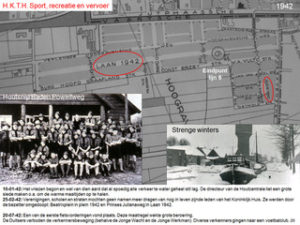 Een verrassende wending in de speurtocht naar het onderduikadres van Paula Bermann. Eerder melden we dat Coen van Es en Paula Bermann op de Julianaweg 377 in Jutphaas waren ondergedoken. Dankzij het speurwerk van Wout Spies is nu duidelijk dat de familie Kooij, bij wie zij ondergedoken waren, in juni 1941 naar Constant Erzaijstraat 39 is verhuisd. Deze straat loopt parallel aan de Julianaweg. Dit nieuwe adres past ook beter bij het vrije uitzicht op de polders van Hoograven, zoals beschreven in het dagboek.
Een verrassende wending in de speurtocht naar het onderduikadres van Paula Bermann. Eerder melden we dat Coen van Es en Paula Bermann op de Julianaweg 377 in Jutphaas waren ondergedoken. Dankzij het speurwerk van Wout Spies is nu duidelijk dat de familie Kooij, bij wie zij ondergedoken waren, in juni 1941 naar Constant Erzaijstraat 39 is verhuisd. Deze straat loopt parallel aan de Julianaweg. Dit nieuwe adres past ook beter bij het vrije uitzicht op de polders van Hoograven, zoals beschreven in het dagboek.
The Charlie Hebdo Attacks In Paris: Defining Islamophobia And Its Socio-Political Applications
Abstract
This article assesses how contemporary definitions of Islamophobia, especially the influential Runnymede report’s definition, met difficulties and challenges after the January 2015 attacks in Paris. It analyses the reactions of European government officials, and oppositional political parties to these attacks through Political Discourse Analysis (PDA). The results show the ambiguous criteria defining Islamophobia in these speeches. The main implication is that more effort is needed to produce a refined and operational definition of Islamophobia.
Key words: Islamophobia, Runnymede Report, Charlie Hebdo attacks, European Union, populism
Introduction
The phenomenon of Islamophobia, considered as fear, dislike or prejudice against Islam and its followers, is arguably as long as Islam itself. In the contemporary world, a pivotal moment in the study of Islamophobia as a phenomenon and its definition was the publication of a report titled: Islamophobia: A Challenge for Us All (Runnymede Trust, 1997, hereafter: The RT Report) by the Commission on British Muslims and Islamophobia, established by the Runnymede Trust. In a pioneering study the independent race, ethnic and religious equality think-tank attempted at the identification of causes and reasons for the phenomenon of Islamophobia as well as defining it. According to the Runnymede Trust, Islamophobia is: ‘… a shorthand way of referring to dread or hatred of Islam – and, therefore to fear or dislike of all or most Muslims’ (The RT Report, 1). And further: ‘the term Islamophobia refers to unfounded hostility towards Islam. It refers also to the practical consequences of such hostility in unfair discrimination against Muslim individuals and communities, and to the exclusion of Muslims from mainstream political and social affairs’ (ibid.; 4). The report reached much further than a mere identification of the terminology and consequently the definition along with its characteristics (outlined below) remain the most quoted and influential study on Islamophobia as a phenomenon and from an etymological perspective. In an attempt at breaking down the causes and reasons for the ‘hatred’, ‘hostility’ and ‘discrimination’ towards Islam the authors made an essential distinction between ‘legitimate criticism’ and ‘unfounded prejudice and hostility’ towards Muslims (The RT Report; 4). Consequently, the commission proposed closed and open views towards Islam and its believers, illustrating two essentialised approaches a non-Muslim can have towards the Islamic religion and its worshippers. ‘Phobic dread of Islam is the recurring characteristic of closed views. [While] legitimate disagreement and criticism, as also appreciation and respect, are aspects of open views’ (The RT Report; 4). Identification of the two contrastive views was based on acknowledging eight main features of each of them. The eight features of the closed/open views were recognized as: monolithic/diverse; separate/interacting; inferior/different; enemy/partner; manipulative/sincere; criticism of West rejected/considered; discrimination defended/criticized; Islamophobia seen as natural/problematic (The RT Report, p. 5).
Francis Fukuyama ~ Identiteit. Waardigheid, ressentiment en identiteitspolitiek
Mensen hechten aan hun waardigheid stelde Francis Fukuyama in zijn invloedrijke boek Het einde van de geschiedenis. In ‘Identiteit. Waardigheid, ressentiment en identiteitspolitiek’ verklaart hij de huidige tijd vanuit diezelfde behoefte: erkenning van waardigheid.
Fukuyama stelt dat het moderne identiteitsconcept drie verschillende verschijnselen verenigt. Als eerste thymos, een universeel aspect van de menselijke persoonlijkheid dat naar erkenning hunkert. Als tweede het onderscheid tussen het innerlijke en het uiterlijke zelf boven de externe samenleving. En als derde een evaluerend idee van waardigheid: niet alleen een beperkte klasse heeft recht op erkenning, maar iedereen, waardoor het een politiek project is geworden.
Vroeger streefde de liberale democratie naar universele erkenning van burgerschap met onvervreemdbare rechten. In de negentiende eeuw gingen de opvattingen met betrekking tot waardigheid in de richting van een liberaal individualisme dat ingebed zou worden in de politieke rechten van moderne liberale democratieën en in de richting van collectieve identiteiten die door een natie of godsdienst gedefinieerd konden worden.
De kenmerken van de hedendaagse wereldpolitiek is dat de dynamische nieuwe krachten die haar bepalen nationalistische of religieuze partijen zijn, de twee gezichten van identiteitspolitiek, en niet op klasse gebaseerde linkse en rechtse partijen die zo prominent waren in de politiek van de twintigste eeuw. Het probleem met de huidige linkse partijen zijn de specifieke identiteitsvormen die zij steeds meer zijn gaan koesteren, aldus Fukuyama. In plaats van solidariteit te ontwikkelen rond omvangrijke collectieven zoals arbeidsklassen, hebben zij zich geconcentreerd op steeds kleinere groepen die op een bepaalde manier zijn gemarginaliseerd. Nu heeft identiteitspolitiek op basis van religie, ras, etniciteit of gender de overhand. Read more
Colin Marshall ~ Roald Dahl, Who Lost His Daughter To Measles, Writes A Heartbreaking Letter About Vaccinations: “It Is Almost A Crime To Allow Your Child To Go Unimmunised”
![]() Generations of us know Roald Dahl as, first and foremost, the author of popular children’s novels like The BFG, The Witches, Charlie and the Chocolate Factory (that book of the “subversive” lost chapter), and James and the Giant Peach. We remember reading those with great delight, and some of us even made it into the rumored literary territory of his “stories for grown-ups.” But few of us, at least if we grew up in the past few decades, will have familiarized ourselves with all the purposes to which Dahl put his pen. Like many fine writers, Dahl always drew something from his personal experience, and few personal experiences could have had as much impact as the sudden death of his measles-stricken seven-year-old daughter Olivia in 1962. A chapter of Donald Sturrock’s biography Storyteller: The Life of Roald Dahl, excerpted at The Telegraph, tells of both the event itself and Dahl’s stoic, writerly (according to some, perhaps too stoic and too writerly) way of handling it.
Generations of us know Roald Dahl as, first and foremost, the author of popular children’s novels like The BFG, The Witches, Charlie and the Chocolate Factory (that book of the “subversive” lost chapter), and James and the Giant Peach. We remember reading those with great delight, and some of us even made it into the rumored literary territory of his “stories for grown-ups.” But few of us, at least if we grew up in the past few decades, will have familiarized ourselves with all the purposes to which Dahl put his pen. Like many fine writers, Dahl always drew something from his personal experience, and few personal experiences could have had as much impact as the sudden death of his measles-stricken seven-year-old daughter Olivia in 1962. A chapter of Donald Sturrock’s biography Storyteller: The Life of Roald Dahl, excerpted at The Telegraph, tells of both the event itself and Dahl’s stoic, writerly (according to some, perhaps too stoic and too writerly) way of handling it.
But good did come out of Dahl’s response to the tragedy. In 1986, he wrote a leaflet for the Sandwell Health Authority entitled Measles: A Dangerous Illness, which tells Olivia’s story and provides a swift and well-supported argument for universal vaccination against the disease:
Olivia, my eldest daughter, caught measles when she was seven years old. As the illness took its usual course I can remember reading to her often in bed and not feeling particularly alarmed about it. Then one morning, when she was well on the road to recovery, I was sitting on her bed showing her how to fashion little animals out of coloured pipe-cleaners, and when it came to her turn to make one herself, I noticed that her fingers and her mind were not working together and she couldn’t do anything.
Read more: http://www.openculture.com/roald-dahl-it-really-is-almost-a-crime
Freedom On The Net 2018
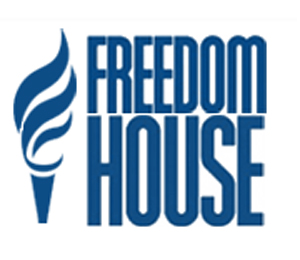 Fake news, data collection, and the challenge to democracy
Fake news, data collection, and the challenge to democracy
Governments around the world are tightening control over citizens’ data and using claims of “fake news” to suppress dissent, eroding trust in the internet as well as the foundations of democracy, according to Freedom on the Net 2018.
At the same time, the regime in China has become more brazen in providing like-minded governments with technology and training that enable them to control their own citizens.
“Democracies are struggling in the digital age, while China is exporting its model of censorship and surveillance to control information both inside and outside its borders,” said Michael J. Abramowitz, president of Freedom House.
These trends led global internet freedom to decline for the eighth consecutive year in 2018.
“This year has proved that the internet can be used to disrupt democracies as surely as it can destabilize dictatorships,” said Adrian Shahbaz, Freedom House’s research director for technology and democracy. “Online propaganda and disinformation have increasingly poisoned the digital sphere, while the unbridled collection of personal data is breaking down traditional notions of privacy.”
Key findings from Freedom on the Net 2018:
– Declines outnumber gains for the eighth consecutive year. Out of the 65 countries assessed in Freedom on the Net, 26 experienced a deterioration in internet freedom. Almost half of all declines were related to elections.
– China trains the world in digital authoritarianism: Chinese officials held trainings and seminars on new media or information management with representatives from 36 out of the 65 countries assessed by Freedom on the Net.
– Internet freedom declined in the United States.
– Citing fake news, governments curbed online dissent: At least 17 countries approved or proposed laws that would restrict online media in the name of fighting “fake news” and online manipulation.
– Authorities demand control over personal data: Governments in 18 countries increased surveillance, often eschewing independent oversight and weakening encryption in order to gain unfettered access to data.
Read more – Full Report: https://freedomhouse.org/freedom-net-2018



